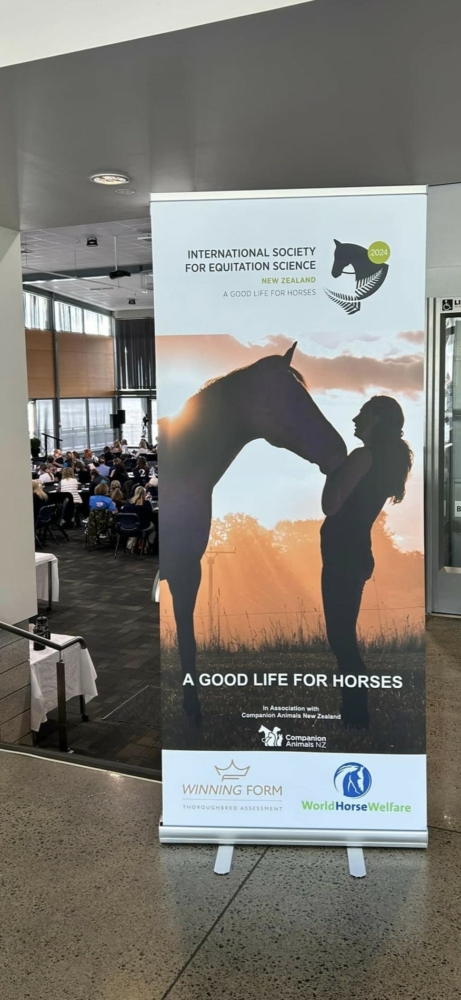
ISES 2024
The International Society for Equitation Science (ISES) Conference held in Cambridge was an opportunity for a gathering of equine researchers, veterinarians and practitioners involved in different disciplines including Thoroughbred Racing, Eventing, Show-jumping, Dressage, Pony Club coaching, Horse therapy and many others, to explore the concept of a Good Life for Horse specifically addressing many questions. Here is ESNZ’s Jumping Sport Manager Marilyn Thompson’s review:
We had many international presenters who presented on scientific findings and the practical application of what science has shown us.
With the thought there is perception and there is reality, and now we have science to inform, I see my learnings as very useful in the monitoring of our horses at competitions, and tools for empowering our stewards, and other officials to call out situations where we are not ensuring a good life for horses at our events.
A couple of take outs for me are:
Learning that the temperature of a horses eyeball increases when the horse is anxious and in a stressful or painful situation. Scientific measurement of a horses eyes, and facial expressions (including blowing through its nostrils) are the best indicator of emotions in a horse. This also translates to our own safety in working with that horse.
Nosebands have a much bigger impact on horses than we sometimes realise. When wearing a noseband and bit, the horse will pull it’s tongue back affecting its airways and ability to breathe normally. Also when tight nosebands are used repeatedly (e.g. training) the horse grows bony growths on the pressure areas such as nose and under chin in response to the pressure. So you could say it disfigures it’s own face.
On the field day I got to visit Cambridge Stud, Cambridge RDA and Pike Racing Stables. All of these are best practice establishments placing a good life for a horse as their number one priority.
Cambridge stud showed us their entire process from serving a mare, foaling, foal handling, weaning and yearling prep. Explaining each step in detail and the measures they take to ensure a horse is well cared for mentally and physically, and grows with confidence along the way. This was evident in the interactions with staff and the stallions, mares and foals we got close to.
Cambridge RDA impressed me for the approach they take to ensuring their horses are happy. They are very aware of a horse needing a one-one relationship with a human which is difficult to do in any riding school situation. Their horses are watched closely for any signs of unhappiness and if needed they are found a new home and career. The horses are taken on hacks, to the beach, and get to go to other homes during the holidays where they might enjoy some pony club, a bit of jumping etc depending on the horse. There is a huge effort going into ensuring mental health alongside their physical wellbeing.
The Pike Racing stable was another best practice establishment with around 80 horses in work. The planning and attention to detail was impressive! The evidence of happiness being the way the horses nibbled at the ear of Tony, their trainer, and he instinctively rubbed their nose and smiled at them. The horses all loved human interaction.
There are tools being released to assist in monitoring how well we are doing in providing a good life for a horse. Two mentioned at the conference are:
Mellorater.org – Based on the 2020 Five Domains Model, the Mellorater animal welfare monitoring app has been developed for use in all species of animals living in captive or managed environments, to help their guardians monitor and enhance their animal’s welfare and lived experience.
E-BARQ – a University of Sydney study, investigates how horse training and management interact with behaviour. Over time, the project will provide researchers with invaluable information on how our training and management affects behaviour and how, in turn, behaviour affects horse welfare.
My final takeout is these words:
“The standard you walk past is the standard you accept.”